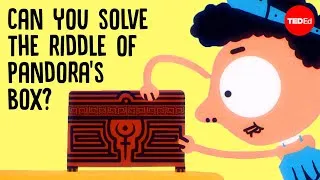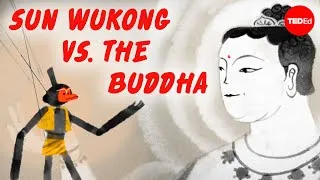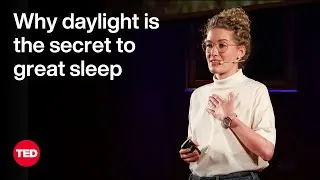First person vs. Second person vs. Third person - Rebekah Bergman
1,238,132 views ・ 2020-06-25
請雙擊下方英文字幕播放視頻。
譯者: Ann Chen
審譯者: Helen Chang
00:14
“I am an invisible man.”
0
14026
2470
「我是個隱形人。」
00:16
“Mrs. Dalloway said she would
buy the flowers herself.”
1
16496
4232
「戴洛維夫人說她會自己去買花。」
00:20
“You are about to begin reading
Italo Calvino's new novel.”
2
20728
4049
「你正要開始閱讀
伊塔羅·卡爾維諾的新小說。」
00:26
These three opening lines,
from Ralph Ellison’s "Invisible Man,"
3
26370
4372
上面三句是這三本書的第一句,
拉爾夫·艾里森的《隱形人》、
00:30
Virginia Woolf’s "Mrs. Dalloway,"
4
30742
2020
維吉尼亞·吳爾芙的《戴洛維夫人》
00:32
and Italo Calvino’s
"If on a winter’s night a traveler,"
5
32762
3800
和伊塔羅·卡爾維諾的
《如果在冬夜,一個旅人》,
00:36
each establish a different point of view.
6
36562
3120
各建立了不同的角度看法。
00:39
Who is telling a story,
and from what perspective,
7
39682
3210
誰在說故事,以及從什麼觀點說,
00:42
are some of the most important choices
an author makes.
8
42892
3520
是作者最重要的幾個選擇。
00:46
Told from a different point of view,
a story can transform completely.
9
46412
4132
從另外一個角度來敘說,
會使故事完全改觀。
00:52
Take this fairytale:
10
52504
1856
以這個童話為例:
00:54
"Rapunzel, Rapunzel,"
the Prince called, "let down your hair."
11
54360
5460
王子喊著:「長髮公主,長髮公主,
將妳頭髮垂放下來。」
00:59
Rapunzel unbraided her hair
and slung it out the window.
12
59820
3530
長髮公主解開她的辮子,
並將它扔出窗外。
01:03
The prince climbed her tresses
into the tower.
13
63350
3070
王子攀爬她的長髮,進入了城堡。
01:06
Rapunzel is typically told like this,
with the narrator outside the story.
14
66420
4644
長髮公主的故事通常是
以敘述者是局外人來講述的。
01:11
This point of view is called third person.
15
71064
3100
這樣的角度,叫做 「第三人稱」。
01:14
But Rapunzel can also be told
by a character in the story—
16
74164
3880
但長髮公主也可以由
故事中的角色來陳述──
01:18
a first person narrator.
17
78044
1810
第一人稱敘述者。
01:19
The tail end of Rapunzel’s locks
plopped down at my feet.
18
79854
3430
長髮公主髮束的尾端落在我腳邊,
01:23
I grabbed on and began to climb… ugh!
19
83284
3330
我抓緊並開始爬……哎呀!
01:26
I couldn’t untangle myself.
20
86614
2080
我無法將自己從這一團頭髮中解開,
01:28
Strands came off all over me,
sticking to my sweat.
21
88694
3710
落下的頭髮覆蓋了我全身,
在我汗水上黏住。
01:32
In a first person narrative, the story
can change dramatically
22
92404
4056
以第一人稱敘述時,
依據哪個角色是敘述者,
故事可因而大大改變。
01:36
depending on which character
is the narrator.
23
96460
4176
01:40
Say Rapunzel was narrating
instead of the prince:
24
100636
3730
如果不是王子,
而是由長髮公主來說故事:
01:44
I hope he appreciates how long it takes
to unbraid 25 feet of hair, I thought.
25
104366
6889
我心想,希望他感謝我花了大把時間
解開 25 呎長的辮子。
01:51
OUCH! I'll be honest; I thought my scalp
would stretch off of my skull.
26
111255
4957
哎喲!說實在;
我以為頭皮會從頭殼上被扯掉。
01:56
"Can you climb any faster?" I yelled.
27
116212
4000
我大叫:「你能不能爬快一點?」
02:00
In second person, the narrator addresses
the story to the reader:
28
120212
4589
用第二人稱時
敘述者直接對讀者講故事:
02:04
He calls your name. He wants you
to let your hair down.
29
124801
5091
他叫妳的名字。
他要妳把頭髮垂放下來。
02:09
You just finished braiding it, but hey–
you don't get a lot of visitors.
30
129892
4458
妳才剛剛編好辮子,
不過 ──妳不常有訪客。
02:14
Third person, first person,
and second person perspectives
31
134350
3880
第三、第一及第二人稱的角度,
02:18
each have unique possibilities
and constraints.
32
138230
3510
各有其獨特的可能性和限制。
02:21
So how do you choose a point
of view for your story?
33
141740
4000
那麼你要如何選擇故事的角度呢?
02:25
Constraints aren’t necessarily
a bad thing—
34
145740
2660
限制並不全然是壞事──
02:28
they can help focus a story
or highlight certain elements.
35
148400
4546
它們可協助故事聚焦,
或強調某些內容。
02:32
For example,
36
152946
1160
例如:
02:34
a third person narrator is necessarily
a bit removed from the characters.
37
154106
4918
第三人稱必然會跟角色有些距離,
02:39
But that can be good for stories
where a feeling of distance is important.
38
159024
4132
但當故事的距離感很重要時,
第三人稱是有益的。
02:43
A third person narrator
can be either limited,
39
163156
3480
第三人稱敘述者可以
「有限(limited)」 ,
02:46
meaning they stick close to one
character’s thoughts and feelings,
40
166636
3880
就是貼近某個角色的想法和感覺;
02:50
or they can be omniscient,
able to flit between characters’ minds
41
170516
3930
或「無所不知(omniscient)」,
悠遊於諸多角色的想法中,
提供讀者更多的訊息。
02:54
and give the reader more information.
42
174446
2849
02:57
A first person story creates closeness
between the reader and the narrator.
43
177295
4875
第一人稱的故事
能拉近讀者與敘述者,
03:02
It’s also restricted
by the narrator’s knowledge.
44
182170
3310
也受限於敘述者的所見所聞。
03:05
This can create suspense
45
185480
1530
這會製造懸疑感,
03:07
as the reader finds out information
along with the character.
46
187010
3910
因為讀者是和角色一起發現訊息。
03:10
A first person narrator
doesn’t necessarily
47
190920
2260
第一人稱敘述者未必
03:13
have to represent the character’s
experience faithfully—
48
193180
3160
得要如實地描寫角色的經驗──
03:16
they can be delusional or dishonest.
49
196340
3020
它們也可能是錯覺或謊言。
03:19
In Kazuo Ishiguro’s novel
"The Remains of the Day,"
50
199360
3384
在石黑一雄的小說《長日將盡》裡,
03:22
Stevens, an aging British butler in 1956,
recounts his many years of service,
51
202744
6548
年長的英國貴族管家史蒂文斯
於 1956 年重述他多年的服侍生涯,
03:29
but fails to acknowledge the flaws
of the man he serves.
52
209292
4000
但對於他主人的缺點隻字不提。
03:33
The cracks in his narrative eventually
draw the reader’s attention
53
213292
3750
他故事中的缺陷最後讓讀者注意到
03:37
to the under-acknowledged failings
of the culture and class system
54
217042
3983
他所處的文化與階級制度的隱憂。
03:41
he inhabits.
55
221025
1600
03:42
Justin Torres’s novel, "We the Animals,"
56
222625
2970
賈斯汀·托雷斯的小說《我們這些動物》
03:45
begins with a plural
first person narrator:
57
225595
3300
以多位第一人稱開始,
03:48
“We were six snatching hands,
six stomping feet;
58
228895
3810
「我們是六隻一直爭搶的手,
六隻一直踩踏的腳;
03:52
we were brothers, boys, three little kings
locked in a feud for more.”
59
232705
5837
我們是兄弟,小男孩,
三個一直在爭奪的小國王。」
03:58
Partway through the story,
the point of view shifts
60
238542
3045
故事行經一半,
視角轉移成單一的第一人稱,
04:01
to first person singular,
from we to I, as the boys come of age
61
241587
4990
從「我們」變成「我」,
發生在男孩們長大,
而其中一位感覺被其他兄弟疏離時。
04:06
and one brother feels alienated
from the others.
62
246577
4100
04:10
Second person is a less common choice.
63
250677
3020
第二人稱比較少被用到,
04:13
It requires the writer to make the reader
suspend disbelief to become another “you.”
64
253697
4814
它需要作者讓讀者
暫時相信自己變成那個「你」。
04:18
Placing the reader
in a character’s perspective
65
258511
2690
讓讀者置身於其中一位角色的看法,
04:21
can build urgency and suspense.
66
261201
2420
能編造出急迫性與懸疑感。
04:23
Sometimes, though,
67
263621
1170
然而有時候,
04:24
second person is intended to distance
the narrator from their own story,
68
264791
4146
第二人稱會企圖把敘述者
與他們自己的故事拉開,
04:28
rather than bring the reader closer
to the story.
69
268937
2740
而不是讓讀者更接近故事。
04:31
In these cases,
70
271677
1130
在此情況下,
04:32
second person narrators refer
to themselves as “you” rather than “I.”
71
272807
5074
第二人稱敘述者將自己
看成「你」而不是「我」。
04:37
Writers are constantly experimenting
with fresh variations on point of view.
72
277881
5201
作者持續嘗試各種觀點的新變化。
04:43
New virtual and augmented
reality technologies
73
283082
3068
新的虛擬及擴增實境技術
04:46
may expand the possibilities
for this experimentation.
74
286150
3580
或許能擴展這種實驗的可能性。
04:49
By placing people at a particular
vantage point in virtual space,
75
289730
4000
藉著讓人置身於
虛擬世界的某個特殊觀看位置,
04:53
how might we change the way
we tell and experience stories?
76
293730
3860
我們能如何改變
敘述和感受故事的方法?
New videos
Original video on YouTube.com
關於本網站
本網站將向您介紹對學習英語有用的 YouTube 視頻。 您將看到來自世界各地的一流教師教授的英語課程。 雙擊每個視頻頁面上顯示的英文字幕,從那裡播放視頻。 字幕與視頻播放同步滾動。 如果您有任何意見或要求,請使用此聯繫表與我們聯繫。







